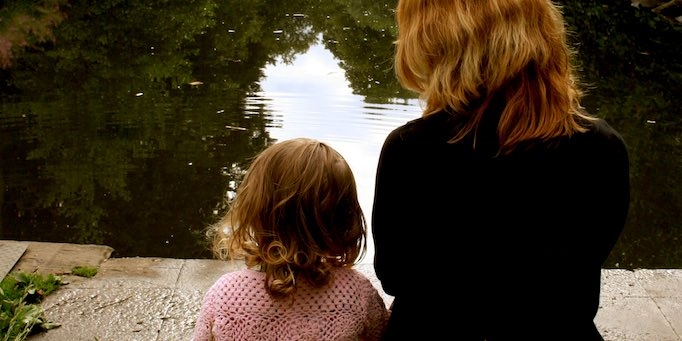
Raising a child with Asperger’s
Penny Morrison on overcoming challenges, dealing with guilt and the long journey ahead.
‘Guess what, Mum?’
We were walking home from school and Amelia (not her real name) sounded like she had some exciting news to tell me.
‘What?’
‘Nobody at school likes me.’
Oh. Ouch. What could I say? I knew she was a fun, creative, caring 3rd grader, but the kids at school thought she was weird.
That was because of her behaviour. It was weird.
I couldn’t work out how to help her. She didn’t care if her tracksuit pants were back-to-front. Kids teased her about sucking her thumb, but she said getting teased made her need to suck her thumb more.
When a boy told her the school would be perfect if only she wasn’t in it, she told him she loved him. Aren’t we meant to love our enemies?
When she felt overwhelmed, she hid under the school desk. When the teacher gave her a jelly bean, Amelia jumped up and down and clapped her hands in excitement.
She was the weird girl and I was embarrassed, frustrated and perplexed. By Year 3 I had paid for and tried various tests, remedies and therapies. These were for her speech delay, sleep problems, tiredness and sensory integration. I had tried to convince the Year 2 teacher to let her repeat.
This was an all-time low. She thought nobody liked her and what could I say? It was true. But it hurt.
The teacher interview was tomorrow. For years my son had far more difficult behavioural problems and my energy had been taken up with him. I felt guilty. If I had been a pushier mum, Amelia might have got more help at school by now. But I didn’t even know what Amelia needed.
Looking for a solution
Naturally, I posted what Amelia had said as my Facebook status. A friend messaged to ask if I had considered Asperger’s Syndrome. Well, I was open to considering anything, so I read about Asperger’s on the www.raisingchildren.net.au website. Much of it was the exact opposite to Amelia, although some aspects did sound like her.
I went to the interview the next day determined to fight for help. The teacher began by explaining that Amelia reminded her of students she had taught on the autism spectrum. Oh, can you imagine my relief? The teacher could see it for herself.
On Amelia’s 9th birthday we went to a psychologist for an assessment. It felt wrong to hope she would be diagnosed with something, but I wanted a step-by-step solution. Still, I felt an odd lurch in my heart when the psychologist said ‘mild Asperger’s’. Deep down some other part of me wanted to hear that my daughter was ‘just normal’.
Despite that odd lurch, I felt a wave of relief. This was partly because I didn’t need to feel guilty about the way she behaved anymore. The school mums thought Amelia was weird because I encouraged it. I felt like she would improve if only I did enough to help her. I had heard others say she was like that because of bad parenting. I didn’t need to blame myself anymore. Now I felt a little guilty for focussing on how it affected me.
Dealing with my guilt
Why do we mums feel guilty so often? We care about our kids and we feel the weight of responsibility for them. If I hadn’t taken Amelia to be diagnosed, would I still be feeling guilty?
I shouldn’t have felt that way. God hasn’t asked me to do any more than make the best decision I can with the information I have. He hasn’t asked me to see into the future or be in control of all things. That’s his job. I don’t need to feel guilty about mistakes or have regrets about past decisions – I did the best I could. I don’t need to worry about the future. I can trust God with that.
Sometimes there are good reasons for feeling guilty. Sometimes our actions are motivated by selfishness, laziness or pride. We are guilty, but Jesus has already taken the blame for these things. If we have trusted in Jesus, then God has forgiven us, so our guilt is gone. We don’t need to drag that guilt around with us anymore. We’re free.
The beginning of a long journey
My relief at the diagnosis was also because I would now be able to find the right therapies and I would be able to get funding. The diagnosis didn’t change who Amelia was, but it gave a good explanation.
The psychologist said Asperger’s is part of the autism spectrum. (Actually, as of 2013, Asperger’s isn’t given as a diagnosis. Amelia officially has ‘mild autism, level 1’.) Asperger’s isn’t an illness; it’s just a different way of thinking. People with Asperger’s have poor social and emotional skills, but can have other strengths. Girls on the spectrum tend to be quite different to boys, which is why the typical boy profile didn’t fit. But if it came down to missing social cues, that was spot on for Amelia. The psychologist told us that Asperger’s isn’t something to be cured, but that Amelia could learn skills which come naturally to others.
I wish this was the end of the story. The mystery was solved and off we went to the appropriate therapy. No. The psychologist gave me a long list of books, websites and possible types of therapists to see.
Raising a child with Asperger’s was overwhelming, but the top priority was still what it had been for years; for Amelia to stop sucking her thumb at school. It was the focus of the teasing and seemed to be the source of many of her problems. With help from the psychologist she learnt new ways of calming herself and, maybe also because she was growing older, she finally stopped sucking her thumb.
She had kicked a major goal, but what happens when a child with Asperger’s kicks a goal? The goalpost sticks out its tongue, sings out, ‘Ner-ner!’ and runs off to the next field.
Keeping her thumb out didn’t solve much. That’s how it is with every achievement she makes.
Progress and further challenges
I’m thrilled at how much Amelia has learnt in the last four years since she was diagnosed. But, for every step she takes forward, her peers take 3 steps forward. It is heartbreaking again and again to see how different she is from her peers. You might think I would get used to it, but I haven’t.
She has made good friends here and there, some who are younger, others who are on the spectrum or have a mild intellectual disability, but she has learnt by experience that most kids don’t like her. Her attempts to be impressive always have the opposite effect. Some girls have gone out of their way to include her in groups, but she feels awkward and withdraws. Generally, she expects other kids not to like her.
Amelia has come a long way, but for every achievement I help her with, I know there are other issues I haven’t helped her with. There are so many decisions to make – which therapy to focus on, which issues to take up at school, which school to send her to. I don’t always know whether I have made the best decision, but I know I have nothing to feel guilty about.
Amelia is happy to be a girl with Asperger’s. It’s who she is – part of her personality. She asked me one day if I wished she didn’t have Asperger’s. It was hard to answer. I wish she didn’t have all these struggles, and I hope she learns new skills in relating to others, but I love her being a quirky kid with an interesting point of view and different way of doing things. I don’t want to change her personality.
Most of all, I hope she might eventually learn to relax, be herself and be confident with her peers. I enjoy being with her just as she is. No matter which way she wears her tracksuit pants.
I hope she will one day expect other kids to like her too.
For further reading
My favourite book on autism is Love, Tears & Autism by Cecily Paterson.
My favourite books about girls on the spectrum are Parenting Girls on the Autism Spectrum: Overcoming the Challenges and Celebrating the Gifts by Eileen Riley-Hall,
Aspergirls by Rudy Simone, and Lisa and the Lacemaker: An Asperger Adventure by Kathy Hoopmann (This is the thrd chapter book in the series, but this one has a girl with Asperger’s as the main character).
Penny Morrison is the author of the Hey! series which introduces infants to God their creator. Discover all her books by visiting the CEP Store.
For more articles from Growing Faith, subscribe to our monthly e-newsletter.
To hear about the latest books and resources from Youthworks Media, subscribe here.







